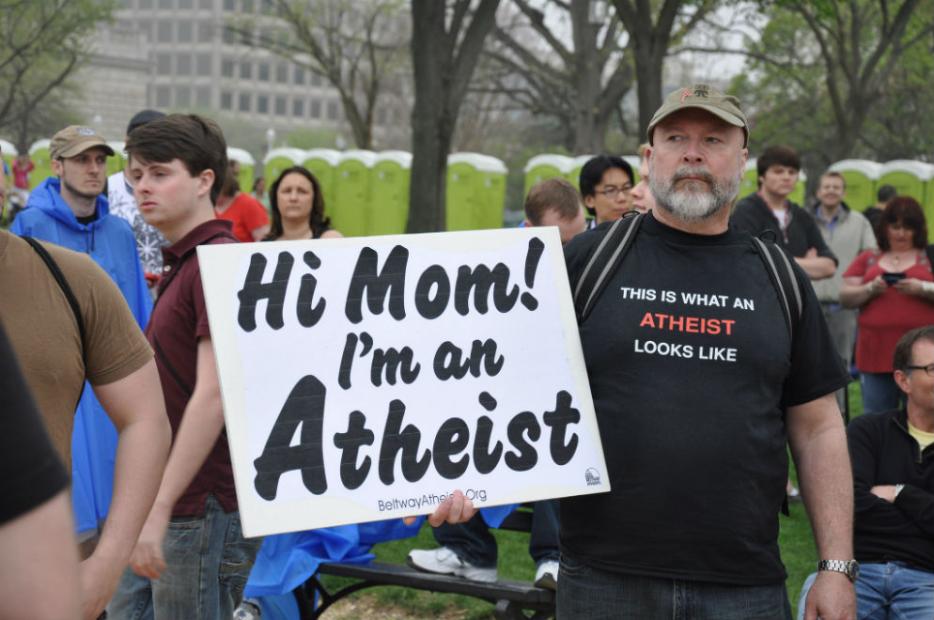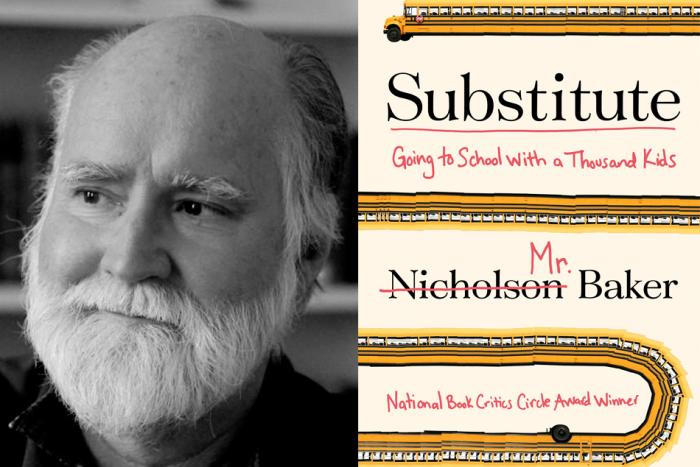When Amanda Knief was nine or ten, a group of Methodist missionaries visited her Iowan church on a fundraising circuit. Fresh from Africa, they showed slides of their recent trip. “I remember a picture of three missionaries, who were whiter than white, and they had all these little black children in front of them in uniforms,” she says. To Knief, as a child, Africa was a large, undifferentiated place in crisis aided only by this particular group of missionaries. The situation was simple: if these missionaries didn’t raise more money and return, the children in the picture would starve.
Later that day, it was Knief’s turn to light the candles in the sanctuary before the service. She’d been thinking about the children all day. She approached one of the elders. “So the missionaries told us that if they don’t get back there, some of the kids are going to die from starvation,” she said. “God knows it’s not their fault they didn’t know about Jesus, right? And they’ll still get to go to heaven?”
The elder sighed and put his hand on Knief’s shoulder. “No,” he said. “They wouldn’t.”
Knief looked at him and replied, “God sucks.”
Today, Knief is the Legal and Public Policy Director for American Atheists, a not-for-profit organization “working for the civil rights of Atheists.” Many people experience the crisis of faith that she described, but not all of them become the face and the legal counsel of one of the most prominent atheist organizations in the world. Especially if they identify as women.
Knief holds a particularly challenging position at a moment when the male dominance of organized atheism has become a hotly debated topic, both inside and outside the movement. In 2012, a number of high-profile incidents of sexual harassment brought attention to the problem of sexism within the movement. Rebecca Watson, an atheist blogger and speaker, cancelled her appearance at a popular annual skeptics’ gathering called The Amazing Meeting (TAM) because, she wrote, she “didn’t feel welcomed or safe” after being “constantly” disparaged with gendered slurs, threatened, and groped at previous events. The Washington Post reported on the controversy, noting that atheists were sharing “stories of unwanted sexual attention at nontheist gatherings, including propositions for sex and unwelcome touching” and that, following Watson’s piece, at least two more bloggers announced that they wouldn’t attend TAM. At least two prominent male atheists—Richard Dawkins, and DJ Grothe, President of the James Randi Educational Foundation and TAM organizer—dismissed their concerns and, ironically, blamed the complainants for scaring other women away. Resultant media coverage tended to come in the form of a question and answer: Why aren’t there more women in atheism? Because of shit like this.
According to the Pew Research Center, the majority of American Christians (fifty-four percent) are women, while the majority of self-identified atheists and agnostics (seventy percent) are men; however, when researchers phrase the question of belief to allow for the possibility that spirituality can be important when one’s religious affiliation is “nothing in particular,” nearly as many women as men check the “nothing” box. The gender disparity in self-identification, community involvement, and subjective faith experience is more complex than it seems.
Many nonbelievers first became aware of the current iteration of atheism as a collective and a political movement through books written by the four men who first achieved mainstream prominence, nicknamed “the four horsemen of New Atheism”: Dawkins, Christopher Hitchens, Daniel Dennett, and Sam Harris. Dawkins’s populist blockbuster books on genetics and evolution paved the way for the runaway success of The God Delusion in 2006. Hitchens, a British journalist and intellectual, wrote the number-one New York Times Bestseller God is Not Great in 2007. Dennett is a cognitive scientist who researches free will, cognition, and evolutionary biology. Sam Harris is infamous for his vitriolic criticisms of Islam and public debates with young earth Creationists.
In many parts of the North America, in-person atheist groups are difficult to find. Consequently, most nonbelievers first connect with other atheists online. Knief says that while the Internet initially provided connection and visibility, the culture and limited access of the early-2000s online community privileged educated, science-oriented white men, especially those who could match the combative, self-assured personalities of Dawkins, Hitchens, Dennett, and Harris.
Among atheists, white people are overrepresented. While LGBT people are almost twice as likely to be religiously unaffiliated as the general public, this is not reflected in the makeup of the movement’s most prominent faces. The rhetoric and narrative of the movement has ultimately focused on the experience of white men of Christian heritage.
Knief says that if those involved want the atheism movement to grow, “it needs to recognize that it has a problem reaching marginalized groups.”
In 2015, a volunteer response demographic survey of Reddit users revealed that eighty percent of respondents were men and eighty percent were between the ages of eighteen and thirty-five. Reddit is where atheism as a movement really took root and blossomed, says Ashley Miller, a feminist writer whose PhD in Communications focused on intersectionality. “Male-dominated spaces in general have a completely different dynamic than gender-equal or women-dominated spaces. Those environments tend to be toxic towards women. Men treat women like this, women drop out. Women show up, there’s no other women there, they leave.” Miller was one of many women who came forward with sexual harassment complaints against Michael Shermer, Executive Director of the Skeptics Society and columnist for Scientific American, for the 2014 BuzzFeed article “Will Misogyny Bring Down the Atheist Movement?”
*
The separation of church and state is the primary actionable concern for most major atheist and secularist organizations. Regular battles and satirical responses to prayer and nativity scenes on public property form the core of atheistic political engagement in North America. Most recently, the Centre for Inquiry Canada called on Saskatchewan Premier Brad Wall to end opening prayers in the legislature as well as explicitly religious Christmas messages from government officials. CFI Canada is concurrently starting a petition to repeal the law that allows the recitation of the Lord’s Prayer in public schools.
Amanda Knief was first motivated to get involved with organized atheism after starting a job at the state legislature in Iowa, when she learned that both chambers opened session with prayer, led by a Clergy of the Day. “They got compensated at the same rate for their mileage as the legislators did, and there was a Clergy of the Day parking spot. And it was a better parking spot than I got,” she laughs. She was stunned that none of her colleagues seemed bothered by prayers being piped through the building, and went in search of others who shared her irritation.
For other women nonbelievers, though, organized atheism’s focus on the separation of church and state can be alienating or unimportant. “At the end of the day, who cares what your religion is if you’re making seventy-seven cents on the dollar and have no ability to progress in your career and are never going to see somebody like you in the White House?” asks Miller. “All of those things feel a lot more real. The same issue happens with ethnic and racial minorities, where it’s like, ‘Yeah, I don’t believe in God, but why is that a big deal for me?’”
Furthermore, the social and economic costs of leaving a church community can be particularly high for women. “Let’s say you’re from Columbia, South Carolina, like I am,” says Miller. “Every charity in Columbia is a religious charity.” Churches fund scholarships, feed families, and provide free daycare and summer camps. “If you’re a person who’s making $25,000 a year and raising three kids, it’s a big deal. For women especially, because they make less in the first place and they’re usually the ones responsible for raising the kids. Why would you care about atheism when your whole family goes to church together and it makes your life easier?”
“One of the things I remember learning early was how Christianity was forced upon slaves on arriving in the United States, and how it was an imposed religion."
Knief echoes this sentiment for her native Midwest. “For women, especially women with children, if you move to a new town, the first thing you do is find a church,” she says. “You have choir, you have study group, and they know all the people in town. People on the city council. People for work. Where to get your hair cut. If you get sick, if you need your electric bill paid, if something is going wrong, they will help you. And when you are a single mom, especially, the church is your lifeline.”
Soraya Chemaly is a well-known writer, feminist, and panellist for Women in Secularism. “For me, there’s such a clear correlation between gender equality and secularism,” she says. “In the United States, we have the poorest maternal health within peer countries. We have high levels of religiosity because women really depend extraordinarily on the safety net that religion can provide.” Chemaly points out that in many regions there is no alternative to Catholic hospitals and relief systems, where women “very clearly” receive care that is compromised by religious belief.
Chemaly says that women will continue to drive religious participation until they have workplace support for childcare and healthcare and are economically free to leave abusive spouses. “Men are freer to go explore their nonbelief,” she says, “because frankly, they have women at home doing all the other stuff.”
Religion has been a tool of oppression, used to colonize nations, entrap and vilify women, and persecute queer people, and many people question their faith for exactly these reasons. Chemaly left the Catholic church because of its systematic misogyny. At the age of eleven, she wanted to become a priest. Nobody could give her a satisfactory explanation why she couldn’t. “I actually think I asked the priest, ‘You mean because I don’t have a penis?’ And I thought, well, that must be wrong. So I studied it and I studied it and I studied it.”
Chemaly eventually wrote her undergrad thesis on heresy and feminist threads in heretic thought. “I was at that point ten years older, and I’m like, yeah, that’s pretty much why. Nothing is convincing me that this isn’t sexism, and corporate bodies that are made up of all men are profoundly unethical and epistemologically skewed, and so, sorry, I’m leaving now. That was pretty much it.”
From this perspective, it’s astonishing that atheism isn’t dominated by women. “Women in the United States are subjected to other people’s religious beliefs to a shockingly high [degree],” Chemaly says. “Reproductive justice, women’s health, ideas about shame, body shame—those are so deeply religious.”
*
Zinnia Jones started making YouTube videos about atheism seven years ago. YouTube was her community and primary hobby, and as she began to transition, she continued to make videos, broadening her focus from atheism to issues of gender and identity. “I’m going to Women and Secularism III this weekend,” Jones says at the beginning of one video. Her head is partially shaved, and her blue tank top reveals a tattoo of the trans symbol on her collarbone. “I feel like this is a good time to get into something relevant,” she continues, “my experiences as a woman in the secular community.”
Viewers often write Jones to tell her that her videos helped them come out as atheist and as trans. But Jones also receives so much negative feedback on her work that the anger and insults are beginning to blur. “I’ve had my content posted on Reddit many times in the atheism section, and the reaction I get is some mixture of homophobia, misogyny, transphobia, and general hostility towards effeminacy,” she says. “A person will look at that kind of community and say, ‘Is this really a place where I can belong? Is this really a group of people who I can work with on shared goals and objectives, together?’ And the answer to that clearly would be, ‘No, this is a space where I am not welcome.’”
Jones points to a simplistic “science fanboyism” that mobilizes the language of science to bolster pre-existing assumptions about gender, biological sex, and gender dysphoria among transphobic atheists. “This is what happens when the banner of science is adopted for a form of social signaling—signifying group membership and an endorsement of group values—rather than a direct interest in obtaining and seeking truth,” she says.
Ashley Miller says that part of the problem is that these skeptics are misusing science as a moral framework and an identity—the role religion is meant to play—rather than as a method of investigation. “With skeptics, it’s like: ‘I believe in the scientific method and questioning things,’” she says. “Which is a great way to answer questions and a horrible way to interact with other people or to see where they’re coming from.”
These skeptics confuse a lack of belief in God with total impartiality, Miller continues. “They’re like, ‘My only worldview is that I question things and examine them with the scientific method,’” she says. “And that’s actually very much not true. You have assumptions about the world, and those assumptions were built by a million different things. And if you don’t acknowledge the fact that you even have a worldview, how can you try to discover what other people’s worldviews are and how they got to them?”
*
Mandisa Thomas was born in New York City in 1976. “I was raised at a time where there was a lot of revolutionary thought on the table—a pivotal time in the Black community,” she says. Thomas’s parents made the decision not to raise their children in the church. Instead, Thomas says, “We were raised with the Black Nationalist mindset, with the conscious community.” For Thomas’s family, Black Nationalism’s independence from white culture included the active rejection of Christianity. “One of the things I remember learning early was how Christianity was forced upon slaves on arriving in the United States, and how it was an imposed religion,” she says.
The first time Thomas attended an atheist meet-up, she had what she says is a common experience among Black atheists. The group was predominantly white. “I was talking to one woman. We were having a good conversation, but then she said, ‘I’ve never met a Black atheist before.’” Soon after, a second Black person entered the room, and the woman Thomas was speaking with offered him her seat. Thomas laughs recounting the story. “I was like, ‘Oh, you know, I don’t know him.’ That blind assumption is very interesting.”
The new person, Benjamin Burchall, began to discuss his experience as a Black, gay atheist. “There was a couple at the table who immediately got defensive,” Thomas says. “One of the gentlemen said, ‘Well, we go through things too.’” Thomas outlined for the couple how marginalized identities intersect with atheism and face different challenges—what it means to be one of the few people of colour in a room, for example. “‘You’re more represented at the table than we are.’”
Burchall and Thomas went on to found Black Nonbelievers of Atlanta. “That backlash, that lack of understanding—we decided it was important for us to form this organization,” Thomas says. “I said, ‘There has to be more of us out here.’ There has to be people who are sitting in their churches, and they don’t know that there is a secular option for fellowship and community, and it’s time for us to build it.” Black Nonbelievers of Atlanta became Black Nonbelievers Inc., a national organization of which Thomas remains president.
While Thomas acknowledges the church’s historical importance after Reconstruction and during the civil rights movement, when fewer alternatives for Black community existed, she contends that the modern church plays a predominantly toxic role. “The doctrine of suffering that was pushed during slavery—you won’t get your heaven until you die—has really, really affected our community for generations now. There’s still this idea that the Lord is going to save us through all of our problems. We are still relying on divine intervention to save us as a community.”
Materialism and sensationalism have overtaken social issues within the Black church, Thomas asserts. “The Black church has generated billions and billions of dollars, yet our communities are still in a state of despair.”
We interviewed Thomas on the first day of Black History Month, and she pointed to the way Black history is usually contextualized. “The Black community seems to think that the church has always been the only sense of support that we had, and I would argue that it isn’t.” Thomas points to freethinkers such as Carter G. Woodson, founder of Negro History Week, which grew into Black History Month, authors Zora Neale Hurston and Lorraine Hansberry, and humanist A. Philip Randolph, one of the key organizers of the March on Washington.
Moreover, Thomas pushes back against the idea of the church as a benevolent provider of charity and social support for its members. “There may be options for childcare, especially during church services, but I think that overall the church is actually taking more from the community than it’s giving,” she says.
*
While working at the state legislature, Knief co-founded Iowa Atheist and Freethinkers. She says that she noticed, right away, that more men than women showed up to the group’s meetings and events. Men who were married with children always came alone, Knief says, “because someone had to stay home and take care of the kids. And they didn’t usually trade off, like, one week the men would come, one week the women.”
“It wasn’t that the women were less interested in atheism,” Knief says. “It’s just that the type of meetings we had were not as interesting to them.” The group began to organize family-oriented events. “And they were hugely successful, when kids were welcome, when whole families were represented. But church does that automatically. Church is for the whole family. And I think that’s something that the atheist movement has not grasped yet.”
Over the last four years, Knief has gone from being the only woman on staff at American Atheists to one of three women in a five-person staff. The first year she was in charge of organizing the national conference, she sought out speakers and vendors that represented and were owned by people of colour and LGBT groups. “If you want your audience to be diverse, having diverse speakers is the best way to do that,” she says. She’s pushed for gender neutral bathrooms at conferences as well as talks that address raising children in an atheist household; she also says the organization has become more conscious of who’s writing for and being profiled by their quarterly magazine.
Knief and others have worked to ensure that atheist conferences have codified harassment policies and third-party mediators who can investigate conflicts and make recommendations without a vested interest in movement personalities or politics.
The rejection of religions that have been oppressive to women, colonized nations, and queer people logically connects atheism with feminism, anti-racism, and anti-homophobia. Zinnia Jones argues that the organized atheism movement needs to embrace these connections and make them explicit. “It’s not just about holding a belief and having conferences about it. It’s about how we put those beliefs into action, how we act ethically, what we do for our society, and what atheism should implore us to do for humanity as a whole,” she says. “The atheist community should stand for something concrete.”







